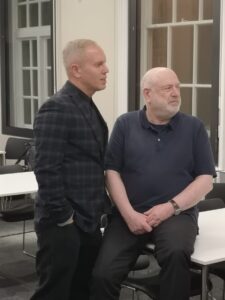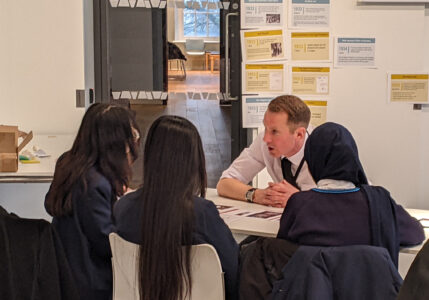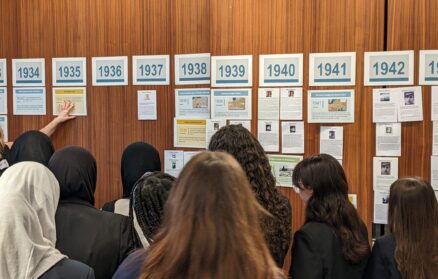Inspired by the two-part BBC and Wall to Wall Media documentary series ‘My Family, the Holocaust and Me’ and featuring Robert Rinder MBE facilitating other second and third generation British Jews – like he and his mother, Angela – to discover more about their families Holocaust related past. RWBA’s innovative and unique educational partnership has reached 240+ schools in just almost 2 years. Young people in participating schools follow one of four British Jewish families’ ‘journey’ featured in the programmes and have immerse themselves in the Holocaust history, through a human story to reflect upon what their learning means for them as individuals (the ‘me’) and with a creative collective school community response (the ‘us’).
The Centre were invited to support this unique project, to provide online bespoke workshops to deepen and enrich student understanding of some of the context to Robert and his mother Angela’s family story, and those of Bernie Graham, Louisa and Natalie Clein and Noemie Lopian. A range of our materials and lessons have been used by project teachers across the country to enhance the students experience and, as two-thirds of the schools participating in the project are UCL Beacon Schools – the Centre’s research and pedagogy underpins the approach. But this week we were proud to partner with RWBA, with Pears Foundation support, to welcome students from three project schools, Paddington Academy, Hendon School and Westminster Academy.
This unique project conference, kindly hosted at London’s Imperial War Museum, saw a remarkable group of young people, of different ages, backgrounds and experience, come together to deepen their knowledge and understanding of the Holocaust, and the stories featured in the project through a bespoke series of workshops, delivered by the Centre team.
What made this event all the more enriching and special, was the presence of Robert Rinder MBE and Bernie Graham, who generously gave their time to surprise the students and work alongside them throughout the day.

It was a pleasure and privilege to welcome Robert and Bernie to the event on Tuesday, and to help create a situation where they could further engage with the project and directly experience young people learning about the story of their family and the Holocaust.
Among his many thoughtful reflections on the visit and workshops Robert Rinder said:
“It was a privilege to bare witness to the transformative nature of the learning in the room – the young learners were courageous and true candles in the darkness – whilst to experience first hand the depth, quality and innovation of the teaching approach, epitomised by Dr Pearce and Centre colleagues’ expertise, and see its impact upon the young learners was a gift.’
Centre staff led and facilitated workshops that sought to respond to two of the projects stated aims – to deepen and enrich student knowledge and understanding of the Holocaust (through a Timeline, and a camps specific workshop that also included an example of resistance), but also, to do some through personal stories and one family – in this case Robert, Bernie or Louisa’s family stories, and their communities in Poland and Lithuania, Germany and the Netherlands.
The Centre’s Helen McCord said:
“Bernie and I, along with colleagues from the IWM, talked with students about evidence and legacy. The images that we have of Sobibor camp are both shocking and illuminating. From the album of the SS deputy camp commandant, they show guards relaxing and smiling in a place of unimaginable horror. That they were hidden from the world until 2020 speaks directly to attempts to hide these crimes and to deny that they happened. Whilst these photographs are difficult and uncomfortable they are important evidence and they highlight how much of this traumatic history we are yet to uncover.”
Students embraced the complexity, drew upon the research, but that combination of knowledge and understanding sat alongside a unique personal and emotive learning experience. Helen said:
“It was an absolute privilege to work with students upon Bernie’s family history and to have Bernie with us too was invaluable. It is such a powerful opportunity for young people to be able to ask Bernie questions and to hear the very personal stories and details about his family, that he is always happy to share.”
The blend of the personal and the academic history was a powerful and compelling mix.

Paddington, Hendon and Westminster students were fantastic. It was clear from their insightful, thoughtful, informed questions, suggestions, observations, and answers that the impact of their learning and engagement across this programme was profound.
Corey Soper who led some sessions reflected it was:
“A great day which really enriched and intensified student understanding. They were able to explore how the stories of Bernie and Louisa’s families related to the wider chronology of the Holocaust and the experiences of other individuals via the innovative galleries at the Imperial War Museum”.

Student contributions revealed depth and breadth of knowledge, their understanding both cognitive and affective, their conduct, respect, warmth and confidence made each and every one a delight to be around – put simply it was a pleasure for Centre’s team to work alongside – they were a credit to their schools, wonderful teachers, families and communities.
Paddington’s Peter Sayer and Sam Ineson reported:
“Thanks once again to Nic, UCL and IWM for organising – our students are incredibly fortunate to be a part of this project. One Year 12 student told me that ‘meeting Robert and discussing the Holocaust and its memory will stick with me forever’… and that they felt like they were ‘doing real history’. And another Year 12 commented on the sessions delivered by Andy as ‘I had to think really deeply about the mindsets of perpetrators but also how the cover of war enabled genocide to take place’”.
Westminster Academy’s Shamima Khanom said:
“Our students at Westminster Academy thoroughly enjoyed the trip and left feeling deeply enriched with knowledge about the Holocaust One Year 9 student left the Holocaust Gallery in tears – she said ‘It is just so sad what people went through then’. A Year 10 student claimed that she had the most interesting conversation with Robert Rinder and she learned so much more about the historical event. For me – Bernie is one of the strongest people I have met, he is so inspiring.”
This collaboration with RWBA builds upon several years of sustained partnership between the school, Trust and UCL. #HtFMeUs is an exciting innovation in the field and we are excited to partner and play a small part in the project’s success to date and are excited with Pears Foundation support to further champion and see the project thrive, evolve and grow.
A visibly moved and inspired Bernie Graham reflected on his visit thus:
“Nicola Wetherall’s work is bearing amazing fruit. I witnessed and experienced a day of compassion, empathy and humanity – one that inspires hope in these challenging times. The students’ insights, appreciation and sensitivity were staggering. Adults please take note. As a trainer and group facilitator myself, and one that can be quite critical of my peers, I must applaud Andy, Helen and Corey and the IWM educator. They were excellent.”
The visit, and student workshops, were a unique occasion and opportunity for Andy, together with Centre colleagues Corey Soper and Helen McCord to work directly with young people and partners. Typically, our staff primarily work with teachers across our ITE, CPD and other professional development programmes – so the opportunity to work with students made for a wonderful collaboration and a day that will live long in the memories of all those involved.
Dr Andy Pearce said:
“We are extremely proud of what Royal Wootton Bassett Academy – one of our oldest Beacon Schools – has achieved through their ‘The Holocaust, their Family, Me and Us’ project. This wonderful initiative is a superb illustration of what can happen when teachers feel empowered and supported, and when students are inspired and energised. In this way, the brilliance of the project resides not just in the innovative idea and stimulus of using the BBC documentary as a vehicle for students to begin a journey into the experiences of the Holocaust and its aftermath – but in how it has galvanised teachers, senior leaders and students alike to engage with complex issues around identity, community, criticality as well as the history and of memory.”
Robert Rinder said of his day:
“The quality of the UCL teaching team on display was so skilful, so impressive, so meaningful… the compassion, knowledge, understanding, curiosity and courage of the young learners was just so powerful and positive. That in the face of such dark, challenging and difficult times we could come together at the IWM in that learning space and sit alongside as one diverse learning community was a gift. It was a reminder of the reason we can be optimistic… typically I engage with the project and young learners online, and I am always so staggered by the care and depth of their questioning, but our time together, in person, provided such realisation of the light is there amidst the darkness and of the power of #HtFMeUs… I was moved and inspired. It’s the most hopeful of days I have had in a long, long time.”
It was a delight for us to welcome Robert and Bernie to IWM and we look forward to an ongoing relationship and continuing the important and compelling conversations that began on Tuesday in the weeks, months, and years to come. It is a pleasure for the Centre to support this initiative.
Professor Stuart Foster, Executive Director of the UCL Centre for Holocaust Education reflected:
“It was a tremendous privilege to spend the day at the Imperial War Museum with so many engaged, thoughtful, and empathetic young people. The ‘Holocaust, Their Family, Me, and Us’ project is truly inspiring and thought provoking. The commemorative event was also enriched by the contributions of Rob Rinder and Bernie Graham, and we are particularly grateful to them for sharing the compelling stories of their family’s relationship to the Holocaust”.
Project creator and curator, Nic Wetherall said:
“…special thanks go to Andy Pearce, Helen McCord and Corey Soper and the UCL team who led the workshops and facilitated the learning discussions…and the wider Centre team who worked behind the scenes in partnership with colleagues at the Imperial War Museum to make the event possible, and such an incredible success (and to the teachers who kept the secret of our special guests from their students!)”.
The Centre offer our warmest congratulations, to our colleague, Nicola Wetherall MBE who has pioneered the project, to Royal Wootton Bassett who have led, and the Trust CEO Jane Coley for continuing to support. We look forward to working closely with Nic, RWBA and future partner schools as a new cohort of schools begin their journey and we will continue to offer whatever support we can as the project evolves.
*Learn more about the #HtFMeUs project, and how to get your school involved for spring 2024 and beyond, by contacting Nicola Wetherall or following @RWBAHolocaust or visit:https://www.htfmeus.co.uk/

